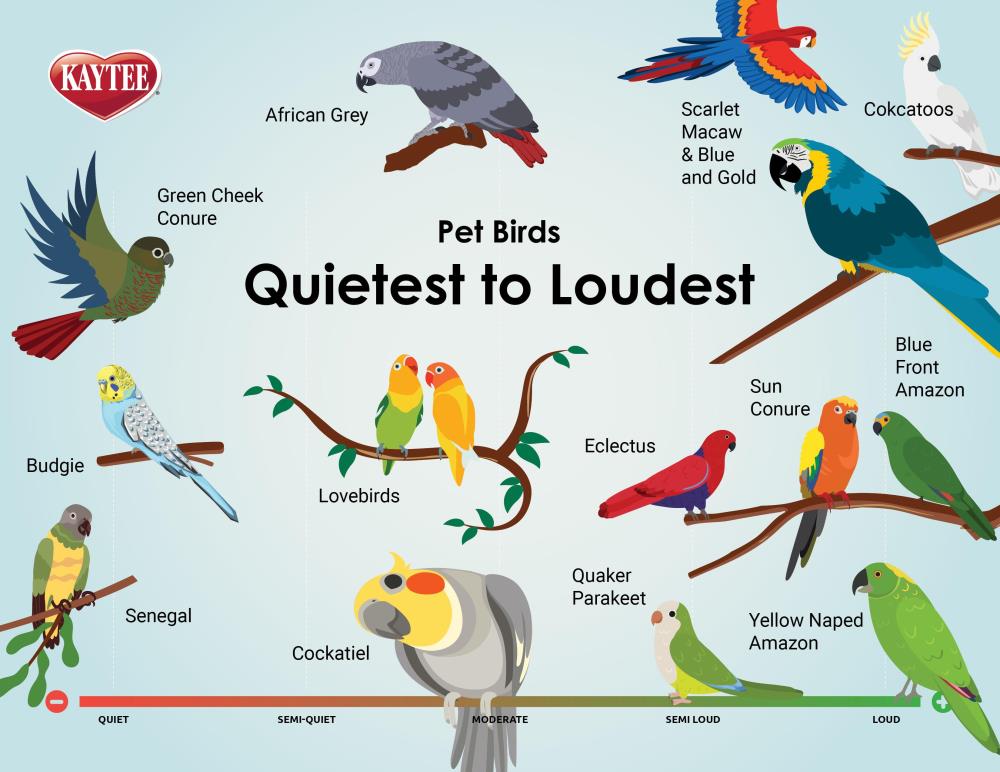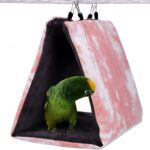Budgies can be moderately loud, especially in social interactions. Their vocalizations are not typically overpowering but can be frequent.
Budgerigars, commonly known as budgies, offer a captivating blend of companionship and vibrant energy, packing a lot of personality into a small package. Native to Australia, these colorful parakeets are highly social birds, thriving on interaction with their flock, human companions, and even their own reflections.
Their chatter comprises a symphony of chirps, tweets, and sometimes mimicked words, forming the soundtrack to their daily activities. Budgies’ vocal range isn’t as loud as that of larger parrots, yet their spirited dialogues can fill a room with life. Ideal as pets for families or individuals, they require a nurturing environment to express their cheerful dispositions and sociability. Embraced for their intelligence and playful nature, budgies connect with their owners through shared playtime and learning, making them beloved pets around the world.
Budgie Vocalization Habits
Budgerigars, affectionately known as budgies, delight their owners with a symphony of sounds. Fascinating to many, budgie vocalizations reveal their moods, needs, and social connections. Understanding these habits not only strengthens the bond with your feathered friend but also brings a sense of harmony within the human-avian shared space.
Common Sounds Made By Budgies
Budgies communicate through a variety of sounds. These range from pleasant chirps and songs to the less soothing chatter and squawks. Recognizing these will help decipher their vocal communication.
- Chirping: Indicative of contentment, often heard when budgies are relaxing or gently interacting.
- Singing: A sign of a happy budgie, full of melodies and varying tones.
- Chatter: Quick successions of sound, signaling excitement or the desire to engage.
- Squawking: Louder, more urgent cries pointing to stress or demand for attention.
- Contact Calls: Loud calls made to maintain contact with flockmates or human companions.
What Triggers Budgie Vocalizations
Budgie vocalizations are prompted by diverse triggers in their environment and their emotional states.
| Trigger | Typical Vocalization |
|---|---|
| Morning Light | Songs and chirps to greet the day. |
| Interaction | Chatter and contact calls during play or feeding. |
| Fear or Stress | Squawks or alarm calls when confronted with a threat. |
| Loneliness | Long, repetitive calls seeking companionship. |
| Happiness | Variety of sounds, including singing and chirping. |
Budgies are social creatures, and their noises often reflect a natural desire to communicate. Their rich vocal range brings life to any home, speaking volumes about their well-being and happiness.

Credit: blog.parrotessentials.co.uk
Volume Compared To Other Birds
Enthusiasts and first-time bird owners often wonder about the noise level of their feathered friends. In particular, budgies—small, colorful parakeets—garner attention for their sound output. Yet, how do budgies stack up against other avian companions when it comes to volume? This section will chirp all about it!
Comparing Budgie Noise Levels
Budgies are indeed vocal creatures, known for their chirps, chatter, and occasional squawks. Their daytime tweets and serenades can fill a room with lively sounds. But just how loud are these sounds?
| Bird | Volume (decibels) |
|---|---|
| Budgie | 68-70 dB |
| Canary | 55-65 dB |
| Cockatiel | 65-75 dB |
| Macaw | 100+ dB |
Relative to their size, budgies make a fair amount of noise but are quieter than larger parrots. The scale above gives a rough comparison of average volumes. Keep in mind, a flock of budgies can increase noise levels significantly, akin to a social gathering of humans.
Quiet Birds Fit For Pets
- Finches: Their soft chirps are ideal for a peaceful environment.
- Canaries: Known for melodious songs with a lower decibel range.
- Budgies: They can be quite chatty but have a manageable decibel level.
- Cockatiels: These birds offer whistle-like sounds, often quite mellow.
- Senegal Parrots: They are quieter, with occasional chatter and mimicry.
Budgies indeed find themselves on the list, for their friendly chatter and moderate sound levels make them suitable for most homes. Volume varies with individual personality and environment. For those seeking whispers from the wings, the smaller birds might be a more fitting choice.
Understanding Budgie Behaviour
Budgies, or budgerigars, are among the most popular pets worldwide. Recognizing their behaviors helps us understand their needs and moods. These small parrots are known for their cheerful chirps and social nature. Yet, potential owners often wonder, “Are budgies loud?” The answer largely depends on their environment, time of day, and social dynamics.
Social Dynamics Influencing Noise
Budgies are flock animals by nature. In the wild, they communicate with their flock to express emotions, signal danger, or simply engage socially. At home, they continue this behavior with humans or other birds. A single budgie might make less noise, while a group can become quite loud as they interact.
Noise levels can also rise if a budgie feels lonely or seeks attention. Plenty of mental stimulation, like toys and interaction, can keep them content and quieter.
Morning Chirps: Starting The Day
Budgies often greet the morning with songs. This is their way of checking in with their flock to ensure everyone is okay. If you notice lively chirping at sunrise, it’s a sign of a healthy, happy bird.
Some people love these morning melodies, while others might find them too loud. To manage morning noise, cover the cage at night to simulate darkness and quiet them down. Timely uncovering in the morning helps set a routine for your feathered friends.

Credit: blog.parrotessentials.co.uk
Nighttime Silence Or Not?
Owners of these charming feathered friends often ponder: are budgies loud at night? Discover the truth about nighttime habits of budgies and how to ensure a peaceful sleep for both you and your bird.
Do budgies stay quiet at night?Do Budgies Stay Quiet At Night?
Budgies, known for their cheerful chatter during the day, generally settle down as the sun dips below the horizon. As creatures of habit, they mirror nature’s cycle, falling quiet when darkness falls. Silence reigns throughout their sleeping hours, barring any disturbances.
Ways to ensure a quiet nightWays To Ensure A Quiet Night
To achieve nighttime tranquility, consider these effective strategies:
- Consistent Sleep Schedule: Stick to a regular bedtime for your budgie to reinforce its internal clock.
- Cage Placement: Keep your budgie’s cage in a dim, quiet area to signal that it’s time to sleep.
- Cover the Cage: A breathable cover provides a cozy environment and helps to muffle any startling noises.
- Reduce Stimuli: Turn off TVs or radios, and dial down the household activity as bedtime approaches.
- Comfort Offerings: Ensure your budgie has a comfortable perch and perhaps a quiet companion if they prefer company.
Implementing these tips will encourage your budgie to embrace the quiet of the night, benefiting everyone’s sleep.
Handling Excessive Budgie Noise
Budgies charm us with their vivid colors and playful nature, but at times, their vocal expressions can reach excessive levels. If your feathery friend’s chatter turns into a relentless concert, handling excessive budgie noise becomes essential. Let’s explore some strategies.
Training Budgies To Be Quiet
Training your budgie is a gentle process that requires time and consistency. Begin by setting a daily routine that includes quiet time. Utilize positive reinforcement when your budgie is calm and quiet. Treats and gentle praises make excellent rewards. Avoid reinforcing loud behavior by staying calm and not reacting to the noise.
- Establish a calm environment to reduce stress-related noise.
- Use soft music or white noise to create a soothing background sound.
- Mirror training can keep budgies entertained and focused, reducing noise.
- Stick training enables you to move your budgie to a quiet spot if needed.
Addressing Squawking Effectively
Squawking often signals a need or a form of communication. Observe your bird’s body language and the environment to identify triggers. Hunger, boredom, or seeking attention might be the cause. Address these needs, and the squawking often subsides.
- Keep a consistent feeding schedule to prevent hunger-related noise.
- Rotate toys and offer interactive activities to combat boredom.
- Give attention when your budgie is quiet to reinforce good behavior.
- If excessive noise persists, consult a vet to rule out any health issues.
Remember, understanding and patience go a long way in curbing excessive noise in budgies.
Safe Sound Environments For Budgies
Budgies, known for their chirps and chatter, bring life into any home. Yet, a safe sound environment remains crucial for their health. Ensuring your feathered friend thrives involves creating an ambience where noise levels are kept in check. Not all sounds are created equal. Explore how to nurture your budgie with the right acoustic surroundings.
Creating A Budgie-friendly Space
Designing the perfect haven for your budgie starts with understanding their needs. A budgie-friendly space is tailored to offer comfort and promote well-being, minimizing exposure to loud and sudden noises.
- Position cages away from household traffic and noisy appliances.
- Ensure the room allows for natural light patterns.
- Provide consistent ambient sounds using soft background music or white noise machines.
- Include ample space for flying and engaging toys to reduce stress.
Impact Of External Noise On Budgies
Loud noises can frighten and stress budgies. Birds are especially sensitive to sound, and their environment should reflect this sensitivity. This can affect their mood and well-being.
| Noise Source | Effect on Budgie |
|---|---|
| Traffic | Stressful & scary |
| Loud Music | Can cause anxiety |
| Shouting | May lead to fear |
Considerations For Apartment Living
Living in an apartment with a pet bird like a budgie requires thought. Loud sounds can travel between walls. Budgies are generally social and vocal creatures, known for their cheerful chatter. But are these delightful chirps too noisy for apartment settings? It’s something to consider before welcoming a feathered friend into your home.
Assessing Budgie Noise For Apartments
Understanding a budgie’s sound levels is crucial when sharing walls. These birds usually start their day with a morning song and chatter throughout the day. Their noise level might be a charm for some; for others, it might be concerning. Average sound levels for budgies range from 40 decibels during a relaxed state to up to 70 decibels when excited or alarmed.
- Chirping: gentle, often throughout the day
- Squawking: louder, usually signifies excitement or to attract attention
- Singing: melodious, happens when they’re happy or content
To gauge if a budgie fits your living situation, visit a pet store or breeder and listen. Note your reaction to their vocalizations. Remember, sounds can amplify in enclosed spaces.
Tips For Keeping Neighbors Happy
With a pet budgie, neighborly relations matter. Here’s how to maintain peace:
- Introduce Your Budgie: Let your neighbors know about your new pet.
- Share Contact Information: Give them a way to reach you if the noise ever bothers them.
- Soundproof: Consider adding acoustic panels or placing the cage away from shared walls.
- Cage Placement: Keep the cage in an area that’s less likely to disrupt others, like the living room rather than next to a bedroom wall.
- Regular Routine: Budgies thrive on routine. It helps to limit their chatter during late hours.
- Tricks and Training: Teach your bird to be quiet on cue. Positive reinforcement helps!
By following these tips, you can ensure that your budgie’s presence is a pleasant experience for everyone involved.
Special Cases: English Budgies
Within the colorful world of budgies, a unique variant stands out: English Budgies. Known for their regal appearance, these birds often become the focus of potential pet owners who are concerned about noise levels. Let’s look into whether English Budgies fall into the louder or quieter side of the spectrum.
Are English Budgies Quieter?
Compared to their Australian counterparts, English Budgies tend to have a softer voice. Bred primarily for shows and their distinct, fuller appearance, these birds often display a calmer demeanor. They chirp and communicate, but the volume and frequency of their sounds are typically lower, making them a popular choice for those seeking a more peaceful companion.
Personality Differences In Budgie Breeds
- Divergent Traits: Each budgie has a unique personality, yet certain trends are evident across breeds.
- Australian Budgies: Often more energetic and potentially louder.
- English Budgies: Display a more relaxed attitude and have a tendency for quieter interaction.
While every budgie has its own character, those looking for a pet with a gentler sound may find English Budgies to be a suitable match. Their persona aligns well with owners who prefer a tranquil bird that still enjoys social engagement.
| Breed | Energetic Level | Volume | Suitability for Quiet Homes |
|---|---|---|---|
| Australian Budgie | High | Louder | Less Suitable |
| English Budgie | Low/Medium | Quieter | More Suitable |

Credit: www.kaytee.com
Conclusion
Understanding the noise levels of budgies helps potential owners set expectations. Delightfully social, these birds express joy and companionship through their chirps and chatter. Preparedness for their vocal nature ensures a harmonious match between budgies and their human friends. Embrace their lively sounds and enjoy the vibrant energy they add to any home.
Ryan Everhart is a passionate bird enthusiast and blogger, primarily writing on his website, Avian Whispers. His journey into the world of bird blogging began with a deep interest in parrots, a species that captivated his attention for their intelligence and social behavior. Over time, his content expanded to cover a broader range of bird species, offering insights into bird behavior, care, habitats, and conservation.
Ryan is dedicated to educating his audience, which includes both new bird owners and seasoned enthusiasts. His writing is filled with personal experiences, expert knowledge, and practical advice on bird care. Through Avian Whispers, he aims to foster a deeper appreciation for birds, emphasizing their role in nature and the joys of having them as pets.
Starting with articles focused on parrots, Ryan’s work now encompasses a diverse range of topics such as feeding, training, habitat enrichment, and bird health. His love for birds extends beyond parrots, diving into various avian species. His informative and heartfelt writing reflects his commitment to the well-being of birds and the desire to help others connect with these creatures.
As a growing voice in the bird blogging community, Ryan strives to provide a platform where bird lovers can learn, share experiences, and connect over a shared passion for avian life. His blogs are not only educational but also serve as a reminder of the importance of protecting and nurturing the bond between humans and birds.




